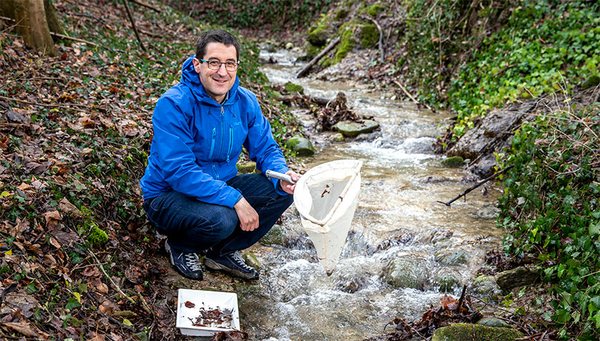News Detail
“It is important to me to communicate knowledge broadly about biodiversity.”
April 12, 2023 |
Ecologist Florian Altermatt was appointed full professor of aquatic ecology by the University of Zurich on 1 April 2023, having already served as associate professor since 2018 and as part of an SNSF-funded professorship at the University of Zurich from 2014 to 2018. At the aquatic research institute Eawag, Altermatt has headed a research group in the field of aquatic ecology since 2011 and has been part of the Directorate since March 2023. His research focuses on how and where biodiversity emerges and changes. He is also developing new methods to measure biodiversity using environmental DNA (eDNA). At the University of Zurich, he has set up the new “Biodiversity” degree programme, which will be offered for the first time in autumn 2023.
Four questions for Prof. Florian Altermatt
Florian Altermatt, this year sees the launch of the new biodiversity degree programme, which you head. What significance does this have for you?
This is a great moment! It is a matter close to my heart that knowledge about biodiversity is communicated even more widely and better. But it has been quite a Herculean task to establish such a degree programme.
What motivates you to teach?
As a professor, I can take up, establish and deepen new research topics. At the same time, I am constantly learning a lot of new things myself. I would like to share this knowledge. My objective is to educate students in a thematically broad and interdisciplinary way so that they can contribute their skills to research, business, society or politics. I find it very gratifying when I meet former students who are working in exciting professional fields – and in the best case, they can use the knowledge from my courses (laughs).
What fascinates you about your field of research, biodiversity?
I find the diversity of organisms and life itself one of the most fascinating phenomena. Insects and other invertebrates in particular are incredibly rich in form, functionally diverse and simply wonderful. For example, in my research group we discovered and described various species of amphipods for the first time in Switzerland, and we are showing that their distribution is shaped by ice-age glaciation, as well as by present-day land uses. For me as a biologist, such discoveries are like a kind of scavenger hunt.
Why did you become a biologist?
I had the desire to study this field since my childhood and the passion for it continues to this day. I grew up in the Lucelle valley in north-western Switzerland, where the River Lucelle, an unobstructed border river between France and Switzerland, creates a wonderful natural landscape. The diversity of organisms in and around the kilometres of natural bodies of water there has left a strong impression on me and is a motivation to work on the preservation of such habitats.
Prof. Florian Altermatt studied biology at the University of Basel, where he completed his doctorate in 2007. He then gained practical experience as a research associate in an ecological office before returning to research as a postdoctoral researcher in 2009. Working at the very interdisciplinary Department of Environmental Science and Policy at the University of California in Davis shaped his further career. Altermatt has been president of the Swiss Biodiversity Forum at the Swiss Academy of Sciences (SCNAT) since 2019.
Cover picture: Prof. Florian Altermatt explores aquatic biodiversity. (Photo: Eawag, Esther Michel)

